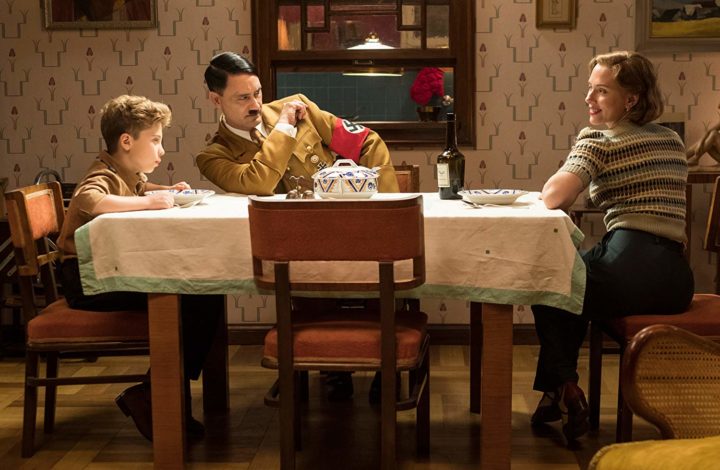
MPAA Rating: PG-13 | Rating: ★½
Release year: 2019
Genre: Comedy, Coming-of-Age, Satire Director: Taika Waititi
A satire about the Holocaust should be funny or horrific or both. Taika Waititi’s JoJo Rabbit is none of these. A tonal misfire, JoJo‘s greatest strength is in reminding us of earlier, better films: Brooks’ The Producers, Chaplin’s The Great Dictator, Lubitsch’s To Be or Not To Be. There are also strong allusions to the style and story of Moonrise Kingdom—which contains no Nazis, as far as I recall—as JoJo Rabbit borrows heavily from Wes Anderson’s colorful dollhouse aesthetic. Yet for all its pastiche and the comedic capabilities of Waititi—What We Do in the Shadows remains an all-time personal favorite—JoJo Rabbit comes across as both beastly and banal in its inability to either truly critique nationalist ideology (the Nazis in particular), as well as its fetishization of the Jewish people for supposed comedic effect. Its gallows humor is too literal, its attempts at evoking sympathy for Nazi characters misguided. Rather than laughter or tears, JoJo Rabbit elicits only cringes, groans, and yawns.
The eponymous JoJo is 10-year-old Johannes (Roman Griffin Davis), a German boy so ideologically entrenched in National Socialism that his imaginary pal is none other than Adolf himself, portrayed by Waititi as an oafish imbecile. With his father off fighting the war somewhere, and his elder sister having died earlier, JoJo is an isolated boy, albeit one who is beloved by his charming mother, Rosie (Scarlett Johansson), and bffs with the bespectacled Yorki (Archie Yates). The film begins with JoJo and Yorki at a Nazi youth training camp led by the snarky one-eyed (possibly gay) Captain Klenzendorf (Sam Rockwell), who shows the lads how to identify Jews and murder people effectively. JoJo is ridiculed for not killing a bunny in a sort of initiation, so he attempts to prove himself with a hand grenade. The disastrous results leave him scarred and relegated to heal/wallow back in his home in dishonor. When JoJo discovers a teenage Jewish girl, Elsa, hidden in an attic crawlspace in his house (portrayed wonderfully by Thomasin McKenzie from Leave No Trace), his loyalties are divided. How can he be both a good Nazi and a good son to his mother, who obviously doesn’t share in his blind ideology?
It’s this blindness which JoJo Rabbit appears to be attempting to dismantle as the young JoJo is slowly converted away from his nationalism and anti-Semitism through his relationship with Elsa. What becomes problematic is the tonal dissonance and the not-to-subtle self-congratulatory vibe. The cast of doofus Nazi characters—Waititi’s Hitler, Rebel Wilson as fellow camp leader Frauline Rahm, Stephen Merchant as a constantly-“heiling” SS agent—are all obvious, deluded morons meant for our derision. Of course all the Nazis are idiotic fools. Of course the Jews aren’t devilish monsters who can telepathically manipulate our minds. But by literalizing the banality of evil through attempted humor, it ends up negating the seriousness of such horrors. Of course they were fools, so that sort of blind bigoted nationalism could never happen today in our enlightened age, could it? (Let the reader understand.) Even more problematic is Rockwell’s Klenzendorf, who becomes a sympathetic character, even a hero of sorts by the film’s grim finale. Like a Nazi version of Rockwell’s character in The Way Way Back, his arc seems to promote a “Not All Nazis” message. Maybe Nazis weren’t all that bad; perhaps some were just misunderstood, like Klenzendorf and JoJo. Moreover, JoJo Rabbit‘s ridiculous conclusion seems to suggest that to combat such violent ideologies only requires a) deception, and b) dancing. I think overcoming horrific evil and sin may require more than rampant deceit and the blasé shaking of one’s hips.
Despite all my above misgivings, JoJo Rabbit apparently works for some people—it won the coveted People’s Choice at TIFF this past fall, a very good indicator for some forthcoming Oscar nominations. In this, JoJo Rabbit shares more than just a Sam Rockwell supporting performance with Three Billboards Outside Ebbing, Missouri: both are comedic flubs disguised as Very Clever Critiques of Society, and both are films appreciated by many intelligent people I truly respect. Regardless of one’s response to the film, we must be willing to address the problems it attempts to satirize, problems which aren’t fanciful in our current day and age—the nationalist idiots in power are sadly not imaginary.
IMDB Listing: https://www.imdb.com/title/tt2584384/
Leave a Reply